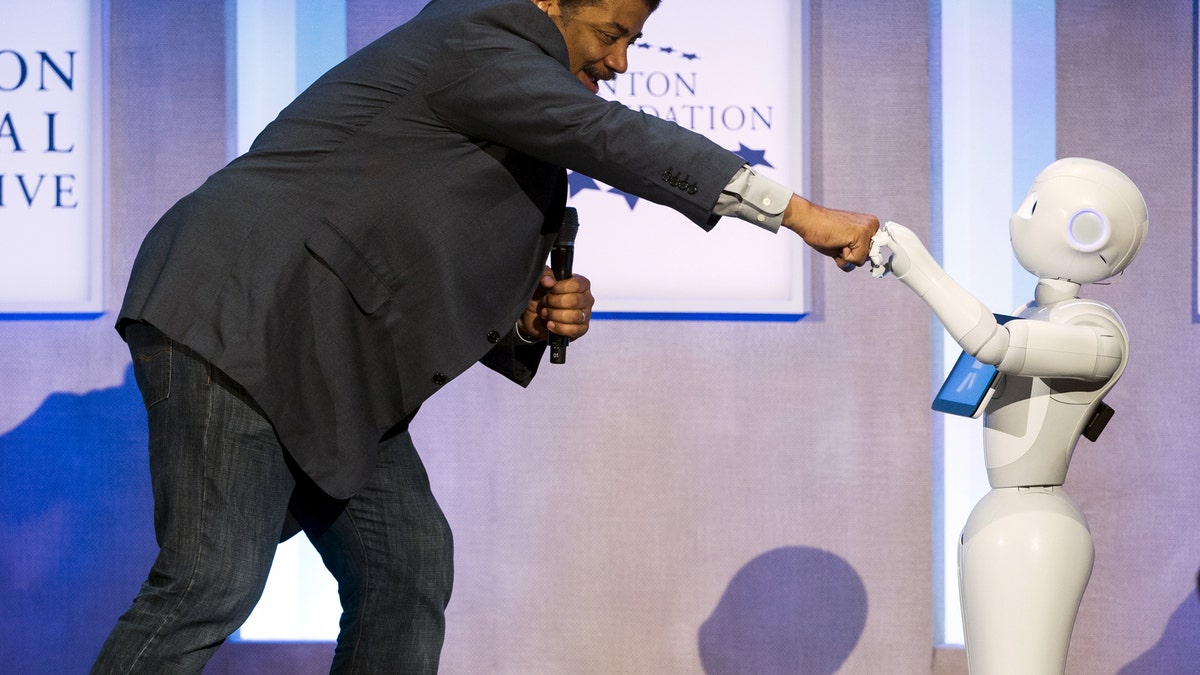
File photo: Astrophysicist Neil deGrasse Tyson interacts with Pepper, a social humanoid robot developed by Aldebaran for SoftBank, during the Clinton Global Initiative's annual meeting in New York, September 28, 2015. (REUTERS/Lucas Jackson)
NEW YORK — Astrophysicist Neil deGrasse Tyson received the Stephen Hawking Medal for Science Communication Tuesday (June 6), becoming the first American scientist to earn the prestigious award.
Tyson, who refers to himself as "your personal astrophysicist," is most known for his television series " Cosmos: A Spacetime Odyssey " and podcast-turned-television-series " StarTalk ." He is the director for the Hayden Planetarium at the American Museum of Natural History here in New York City, where Tuesday's announcement was made.
The Stephen Hawking Medal is an annual award created in association with the Starmus Festival , an international gathering celebrating science and art that will take place in Trondheim, Norway, on June 18-23 this year. Medals are given to science communicators in three categories: writers, musicians and artists, and people in the film and entertainment industry. Hawking, a famous theoretical physicist and author of several best-selling books about the universe, handpicks the recipients himself. [ he Most Famous Astronomers of All Time ]
Winning in the music/art category this year is Jean-Michel Jarre, a French electronic music composer whose work has been largely inspired by space, technology and science fiction. In the entertainment category, producers of the CBS sitcom " The Big Bang Theory " received the medal.
More From Space.com
Previous recipients of the award include the German composer Hans Zimmer, for his score on the film " Interstellar ," and film director Jim Al-Khalili, for his work on the documentary " Particle Fever ."
During the announcement, Tyson said he was "deeply moved not only to be honored at all, but to be honored by Stephen Hawking , who many of us know as the brilliant scientist that he is, but in addition to that fact, he's devoted a huge part of himself to bring science to the public."
Hawking was not present at the announcement in New York Tuesday, but he did make a video appearance on the big screen to personally congratulate the award recipients. Tyson said he'll be "venturing to Norway in two weeks to receive the medal personally from" Hawking at the Starmus Festival.
Space.com asked Tyson what he thinks makes for effective science communication, particularly when it comes to controversial subjects like climate science, vaccines and the shape of the Earth (which is definitely not flat ). He said the best way to approach discussions like these, in which people either do not understand the underlying science or flat out deny it, is to give people what they need to reach the right conclusion themselves, or "empowering ideas rather than just giving people something else to think.
"Education is not just pouring in knowledge," he added. In other words, good science communicators teach people how to reach the right conclusions through logic and reason, not by simply regurgitating facts. [ Boom! Watch Neil deGrasse Tyson Drop Mic on B.o.B's Flat-Earth Theory ]
Empowering people to better understand scientific concepts also means making this material accessible and easy to understand. For example, Tyson's latest book, " Astrophysics for People in a Hurry " (W. W. Norton & Company, 2017), breaks down the science of complicated stuff like black holes and quantum mechanics into little nuggets of easily digestible information, making it more enjoyable for more people to read.
Email Hanneke Weitering at hweitering@space.com or follow her @hannekescience . Follow us @Spacedotcom , Facebook and Google+ . Original article on Space.com .








































